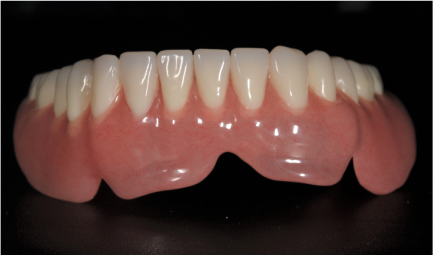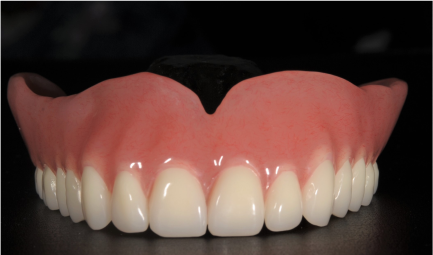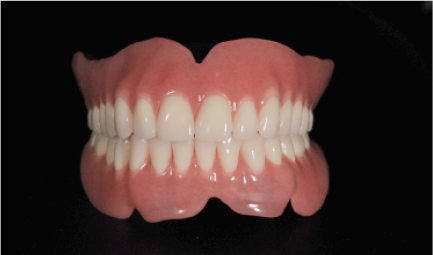Dentures



What are Dentures?
Gone are the days when pulling out damaged teeth and replacing them with dentures was the norm. Nowadays, dental professionals focus on preserving natural teeth for as long as possible with proper care. However, there may still be instances when you need to consider dentures to replace damaged or missing teeth.
Dentures can help you maintain your ability to eat and drink normally, as well as your appearance. Whether you need a full or partial denture, our dental experts can provide the guidance and care you need to make the best decision for your oral health. Contact us to learn more
Types of Dentures
If you are missing teeth, dentures may be a solution to help restore your smile and improve your ability to eat and speak. Full dentures are used when all teeth in a jaw are missing, while partial dentures are used when only some teeth are missing. Partial dentures can be made from both plastic and metal, or a combination of both, and are designed to replace only the missing teeth. It is important that any remaining natural teeth are healthy to support the partial denture. Our dental professionals can help you determine which type of denture is right for you.
Making Dentures
Your oral health professional can suggest which options might be best for you, based on your particular circumstances.
If you need dentures, you can have them made by a dental professional, such as a dentist, dental prosthetist, or specialist prosthodontist. Dentures are custom-made to fit your mouth, which means that, you will need to have several dental appointments to ensure that the measurements are accurate and the denture fits comfortably.
There are different ways to make dentures depending on your situation. If you have recently had teeth removed, measurements are typically taken about three months after the teeth have been removed to allow time for the gum and bone to heal. If you have had missing teeth for a while, denture measurements will start after your remaining teeth have been checked to ensure they are healthy enough to support the denture.
Immediate dentures may be an option if you do not want to be without teeth for a few months. In this case, the measurements are taken before your teeth are removed, and the dentures are ready-to-be-put-in immediately after the extraction. However, changes to the bone after the teeth are removed may cause the denture to become loose over time, and adjustments or relining may be necessary.
Dentures may need to be replaced after several years as your gums change with age. Your dental professional can help you decide which options are best for you based on your individual circumstances.
Preparing for Dentures
Experiencing tooth loss can be an emotional experience, and it’s not uncommon to feel a range of emotions such as grief, denial, anger, and depression. This can lead to a loss of confidence and self-consciousness when eating, talking, or smiling. It’s important to take the time to prepare yourself emotionally before getting dentures. If you’re feeling worried or have concerns, speak with your oral health professional for support and guidance.
Getting used to Dentures
New dentures can take some time to adjust to, and it is common for people to report that they feel unusual at first. Eating with dentures may also take some time to feel normal, and it is recommended to start with soft foods, eat them slowly, and cut them into small pieces. Gradually, hard foods can be reintroduced, but, some foods may need to be avoided. If dentures press on the gum tissues during eating, it may cause sore spots.
In such cases, it is essential to return to your dental clinic for adjustments. Talking while wearing dentures may also take some time to get used. Dentures may make you sound slightly different, and you might hear them click. You may need to use ‘denture glue’ to keep your dentures stable, especially if your bone is thin. If you continue to experience difficulties even after a few weeks, see your oral health professional dentist for further advice.
Complications of Dentures
You may experience some issues with your dentures. See your oral health professional if you have:
- Pain
- Dentures that don’t fit well or are uncomfortable
- Loose Teeth
- Bleeding Gums
- Swelling
- Ulcers (sores) that last more than Two Weeks
- A Gum Abscess (pus-filled sore on the gum)
- Soreness or Cracks in the corner of your mouth
- Bad Breath.
Ask your oral health professional how often you should have your dentures checked.
Caring for your Dentures and your Mouth
Proper denture care is essential for maintaining good oral health. Follow these tips to keep your dentures clean and healthy:
- Clean your dentures twice a day, in the morning and before bed.
- Remove your dentures before going to bed to give your mouth a chance to rest.
- Brush all surfaces of the denture with a denture brush and mild soap or denture paste to remove food and plaque build-up.
- Rinse well with water and clean any remaining natural teeth while your dentures are out.
- Store cleaned dentures in a clean dry container overnight.
- Rinse your dentures in cold water after meals.
Remember to see your oral health professional if you have any difficulties or concerns about your dentures.

